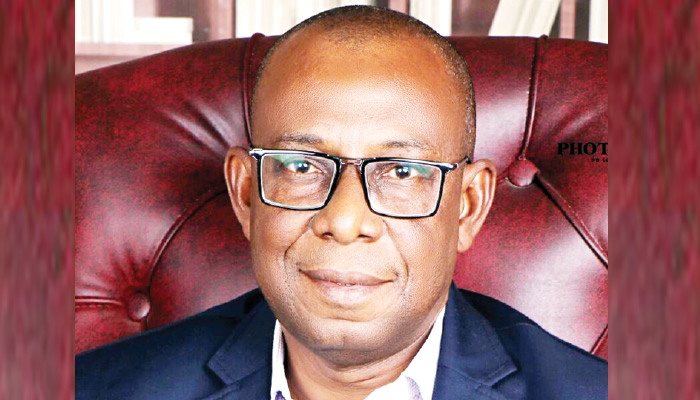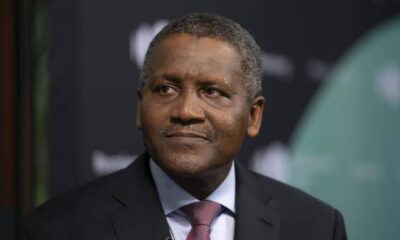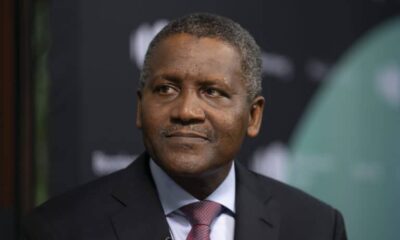Business
World Bank Report Highlights Insufficient Health and Education Spending in Nigeria

According to a recent report by the World Bank, Nigeria’s public expenditure on health and education falls significantly below international standards, posing challenges for basic service delivery.
Titled ‘Human Capital Public Expenditure and Institutional Review,’ the report emphasizes that Nigeria allocates only about 12% of its Gross Domestic Product (GDP) to public spending, which is lower than the Sub-Saharan African average of 17.2% and the average of 18.5% for lower middle-income countries. Over the past five years, Nigeria’s spending on health and education has ranged between 10% and 12% of GDP, which the report deems inadequate for meeting essential public service needs.
The report further notes that Nigeria’s per capita spending on education stands at $23, with states contributing $14 and the federal government covering the rest. Similarly, the per capita spending on health is $15, with states contributing $8.5. These figures are described as inadequate when compared to international benchmarks, especially considering the country’s challenges with out-of-school children and child mortality rates.
The World Bank attributes the low spending levels primarily to constrained overall public spending, influenced by low revenue generation. In 2021, allocations to education and health constituted 10.1% and 6.6% of the national budget respectively, with larger shares allocated to general public services and economic affairs.
The report recommends increasing budget execution rates at state levels and enhancing federal and state allocations in the medium to long term to ensure adequate financing for health and education services. It underscores the importance of political will and commitment from Nigerian leaders to improve funding in these critical sectors, enhance the national health insurance scheme, and prioritize transparency and accountability in expenditure.
Commenting on the findings, Professor Tanimola Akande, a Public Health expert, highlighted Nigeria’s shortfall in health funding compared to international benchmarks, attributing it to poor health outcomes and infrastructure challenges. He stressed the need for improved budget performance and efficiency in spending to enhance healthcare delivery and reduce dependency on external funding.
The report underscores the urgent need for Nigeria to prioritize and increase investments in health and education to improve public service delivery and foster national development.
Business
China bans hidden car door handles over safety concerns

China has announced a nationwide ban on hidden car door handles, becoming the first country to formally prohibit the design amid growing global scrutiny of electric vehicle (EV) safety and a renewed focus on passenger protection.
The new regulations, issued by the Ministry of Industry and Information Technology, will require all cars sold in China to be fitted with mechanical door releases on both the inside and outside. The rules are set to take effect on 1 January 2027, giving manufacturers time to adapt while signalling a clear shift towards more practical and safety-focused vehicle design.
Hidden door handles, which sit flush with the car body and often rely on electric power to deploy, were popularised by Tesla and have since become widespread across China’s rapidly expanding new energy vehicle (NEV) market. NEVs include fully electric cars, plug-in hybrids and hydrogen fuel-cell vehicles. According to figures cited by state-run China Daily, around 60% of the top 100 best-selling NEVs in China currently use hidden handles.
The decision follows a series of high-profile safety concerns, including two fatal crashes in China involving Xiaomi electric vehicles, where suspected power failures may have prevented occupants or rescuers from opening the doors. While investigations into those incidents are ongoing, regulators have moved proactively to reduce similar risks in the future.
Under the new standards, every passenger door except the boot must include a recessed space of at least 6cm by 2cm by 2.5cm on the exterior, ensuring that door handles are always accessible. Inside the vehicle, manufacturers will be required to clearly mark door-opening mechanisms with visible signs measuring at least 1cm by 0.7cm, making emergency exits easier to identify in stressful situations.
Cars that have already received regulatory approval and are close to entering the Chinese market will be granted an additional two-year grace period to update their designs, a move intended to balance safety improvements with industry stability and innovation.
Although the rules apply only to vehicles sold in China, the country’s central role in the global automotive industry means the impact is likely to be felt well beyond its borders. China is the world’s largest EV market and a major exporter of electric cars, components and technology, making its regulatory decisions highly influential.
International regulators are already paying close attention. Tesla’s door handle design is currently under investigation by US safety authorities, and European regulators are also considering whether similar measures are needed. In November, the US National Highway Traffic Safety Administration (NHTSA) opened an investigation into Tesla’s electric-powered door handles after receiving reports that they stopped working without warning. The probe focused on 2021 Model Y vehicles, with nine complaints recorded, including four cases where owners said they had to break windows to free occupants.
Chinese officials have framed the new rules as part of a broader effort to ensure that rapid innovation in the EV sector does not come at the expense of basic safety. By mandating simple, mechanical solutions alongside advanced technology, regulators say they are reinforcing consumer confidence and supporting the long-term, sustainable growth of the industry.
Business
Trump Says Venezuela Will Hand Over Up to 50 Million Barrels of Oil to US After Political Transition

US President Donald Trump has announced that Venezuela will “turn over” between 30 million and 50 million barrels of oil to the United States, following a military operation that removed President Nicolás Maduro from power and ushered in an interim administration in Caracas.
In a statement posted on his Truth Social platform on Tuesday, Trump said the oil — valued at about $2.8bn (£2.1bn) at current market prices — would be sold at full market value, with the proceeds placed under US control. He added that the funds would be used to benefit both the Venezuelan people and the United States.
“I am pleased to announce that the Interim Authorities in Venezuela will be turning over between 30 and 50 MILLION barrels of high-quality, sanctioned oil to the United States of America,” Trump wrote. “This oil will be sold at its market price, and that money will be controlled by me, as President of the United States of America, to ensure it is used to benefit the people of Venezuela and the United States.”
The announcement came a day after Delcy Rodríguez, formerly Venezuela’s vice-president, was sworn in as interim president. Maduro has been transferred to the United States, where he is facing long-standing drug-trafficking and weapons-related charges.
Trump also said the move marked the beginning of a broader economic reset for Venezuela, predicting that the US oil industry would be fully operational in the country within the next 18 months. He added that he expected major international investments to flow into Venezuela as stability returns and sanctions are restructured under the new political arrangement.
“This is the start of something very big,” Trump said earlier this week, arguing that Venezuela’s vast energy resources could once again be developed at scale with international backing and modern infrastructure.
The proposed oil transfer has drawn strong reactions internationally. China, which has been Venezuela’s largest oil customer in recent years, criticised the announcement and objected to reports that the United States is seeking exclusive access to Venezuelan crude. Beijing said it opposed any arrangement that sidelines existing commercial partners.
Despite the criticism, US officials have framed the development as a pathway to economic recovery for Venezuela after years of sanctions, declining production and political isolation. Supporters of the plan say the controlled sale of oil could provide immediate financial relief while laying the groundwork for longer-term reforms.
Venezuela holds the world’s largest proven oil reserves, but output has been severely constrained in recent years due to underinvestment, infrastructure decay and international sanctions. Trump’s administration argues that renewed engagement with US energy firms and access to global markets could help restore production and stabilise the country’s economy.
Global oil markets reacted cautiously to the announcement, with prices easing slightly amid expectations of additional supply, though analysts noted that the volumes discussed remain modest relative to total global consumption.
Business
Gold price rises after US captures Venezuela’s Maduro

Global financial markets reacted swiftly after the United States captured Venezuelan President Nicolás Maduro, with investors moving to position themselves amid heightened geopolitical uncertainty and expectations of shifting economic dynamics.
Prices of precious metals rose sharply as market participants sought the relative safety of so-called safe-haven assets. Gold climbed by about 2.4% to $4,433 (£3,293) an ounce, reflecting increased demand from investors looking to protect portfolios against global risk. Silver also recorded strong gains, rising by 4.9%, underlining a broader move into defensive assets during early trading.
Defence stocks across Europe advanced in response to the weekend’s developments, as investors anticipated the possibility of higher military spending by governments reacting to changing geopolitical realities. Analysts noted that such shifts often benefit defence firms in the short to medium term, contributing to the positive momentum seen in the sector.
Oil markets, by contrast, were more measured. Crude prices fluctuated in early Monday trading as investors assessed whether Washington’s intervention in Venezuela could materially affect global supply. Brent crude edged up just 0.5% to $61.06 a barrel, with analysts pointing out that ample global supplies were likely to cushion any potential disruption from Venezuela.
Despite the relatively stable oil price, energy stocks — particularly in the United States — showed notable strength. Shares in US oil companies rose in premarket trading on expectations that American firms could gain greater access to Venezuela’s vast oil reserves. Chevron, currently the only US company operating in the country, saw its shares jump by more than 7%, signalling investor optimism about future opportunities.
US President Donald Trump has openly stated his intention to tap into Venezuela’s significant oil wealth following the seizure of Maduro. He said the United States would “run the country until such time as we can do a safe, proper and judicious transition”, comments that markets interpreted as a signal of potential policy shifts with long-term economic implications.
-

 News1 week ago
News1 week agoAndrew and Epstein asked exotic dancer for ‘sex acts,’ legal letter claims
-

 Business1 week ago
Business1 week agoChina bans hidden car door handles over safety concerns
-

 News1 week ago
News1 week agoClintons Agree to Testify in Epstein Probe as Congress Pauses Contempt Push
-

 News4 days ago
News4 days agoRussia Identifies Suspects in Shooting of Senior General
-

 News4 days ago
News4 days agoIranian Nobel Laureate Faces New Sentence as Support and Global Scrutiny Intensify
-

 News3 days ago
News3 days agoStarmer Vows to Stand Firm as He Rallies MPs Amid Mounting Political Pressure
-

 News1 week ago
News1 week agoLife Sentence Brings Closure After 2024 Attempt on Trump’s Life
-

 News2 days ago
News2 days agoNine killed and 25 injured in shootings at school and home in Canada





















